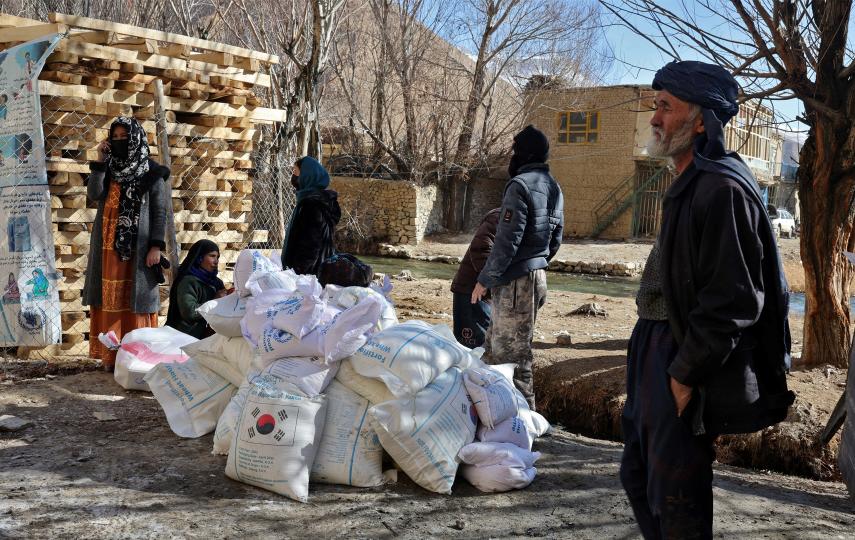Our editors’ weekly take on humanitarian news, trends, and developments from around the globe.
On our radar
A ‘dangerous’ Yemen designation
Despite the best lobbying efforts of a bevy of aid groups, US President Donald Trump's administration intends to designate Yemen's Houthi rebels, Ansar Allah, as a “Foreign Terrorist Organisation”. NGOs variously decried the move as “a counterproductive and dangerous policy that will put innocent lives at risk”, one that will have a “devastating impact” on civilians, and “pure diplomatic vandalism”. Saudi Arabia and the Yemeni government of President Abd Rabbu Mansour Hadi, who have been fighting the Houthis for nearly six years, backed the move. US counter-terrorist designations usually have exemptions for humanitarian work, and the statement announcing the designation – set to be made on Trump’s last day in office – said this would be no different. But humanitarian and diplomatic work is often made incredibly complex by such rules, and those trying to get aid to a hungry country and push forward stalled peace talks are worried. Read this for more.
Hunger doubles in Madagascar
One third of people in southern Madagascar will struggle to feed themselves over the next few months as a result of three consecutive years of drought and a COVID-19-triggered economic recession. Until the next harvest in April, 1.35 million people will be “food insecure” – almost double those in need last year – and 282,000 of them are considered “emergency” cases. The pandemic has intensified the hardship. This is the lean season, when families typically rely on casual labour in towns or on farms to tide them over. But work is scarce as a result of lockdowns and the struggling economy. "To survive, families are eating tamarind fruit mixed with clay," said the World Food Programme’s representative in Madagascar. “With no rain and a poor harvest, people will face starvation." The drought has been particularly devastating in Amboasary district, in the southeast. A WFP assessment found mothers unable to breastfeed, giving their babies water instead. Three in four children have dropped out of school to help their parents forage for food.
Surviving Lebanon’s COVID curfew
Lebanon headed into a 24-hour curfew on 14 January, in an attempt to stem a rising tide of COVID-19 infections that has seen the health minister hospitalised and is threatening to overwhelm the healthcare system. Previous lockdown measures have failed to slow this wave, but some worry that the tough new measures – even grocery stores will be closed, except for deliveries – will hit the country’s most vulnerable hard. Save the Children warned that much of Lebanon’s population can’t afford to buy enough food for the planned 11-day shutdown. “We fear they will face hunger as it is uncertain whether stores have the capacity to deliver food to people’s homes,” the aid group said. The government said it would be giving out cash to help counter the impact of the lockdown, but that’s not likely to reach people right away. The same goes for any money set to come through a (seemingly complicated) $246 million three-year World Bank project just announced to help people in Lebanon.
Coronavirus cases spike in Zimbabwe
Responding to a sharp rise in COVID-19 infections, Zimbabwe has also re-introduced a hard lockdown that will run for a month. All but essential services have been closed – including the informal markets where most Zimbabweans shop or trade. Supermarkets in wealthier suburbs remain open but shut early. The police are enforcing a 6pm to 6am curfew and social gatherings are banned. Zimbabwe was hit by a surge in COVID infections at the beginning of December, and the trajectory has continued. The highest daily death rate so far was recorded on 13 January, with 38 fatalities out of 1,017 new infections. Zimbabwe has a cumulative total of around 25,000 positive cases, but the country’s testing capacity is limited, as are beds and oxygen supplies. Meanwhile, to tackle its own COVID spike, South Africa shut all land borders on 11 January, including the Beitbridge crossing point to Zimbabwe – the busiest in the region. The closure ends a week of chaos, including four-day-long tailbacks, after South Africa demanded COVID test results from all travelers entering the country. South Africa is a key labour market for Zimbabweans.
Problems pile up for Ethiopia
A long-running border dispute between Ethiopia and Sudan is flaring. Citing colonial-era treaties, Khartoum believes it is the rightful owner of al-Fashqa. But Ethiopian farmers also live in the region, and Addis Ababa claims Sudanese troops grabbed property from them late last year while its army was preoccupied with the war in nearby Tigray. The al-Fashqa conflict escalated this week as Sudan accused Ethiopian forces of killing civilians and flying a plane into its airspace. Elsewhere in Ethiopia, three top officials from the rebellious Tigray People’s Liberation Front were killed by federal forces, the government said. And more than 80 people were killed on 12 January in the northwestern region of Benishangul-Gumuz, which borders Sudan. Witnesses blamed an ethnic Gumuz militia for the massacre – the latest in a series of atrocities targeting members of the province’s minority ethnic groups.
Parsing China’s aid data
The World Bank offers no available data for China’s aid spending, and researchers have for years been left trying to cobble together a picture of it from media reports and other public sources. In a new policy paper, Beijing sets out its approach – and its track record – in international development cooperation, including its Belt and Road strategy. China is both the world's second-largest economy and the "world's largest developing country", but the new policy document says it still provides at least $4 billion a year in international aid grants (about the same as Norway). That’s only about 0.02 percent of its Gross National Income. But the (widely ignored) 0.7 percent of GNI aid target set by the UN doesn’t apply to China, as its per capita income is only about a quarter of that of high-income countries. The figure of $4 billion is based on a total given from 2013-2018, excluding concessional loans. In the paper, China vows to "improve the statistical indicator system of foreign aid”. It also says it plans to “steadily increase” aid spending and give more financial support to international organisations, including UN agencies and the International Committee of the Red Cross.
In case you missed it
BRAZIL: A new variant of the coronavirus originating from Brazil’s Amazonas region has been identified in Japan. While researchers and health authorities assess its infectiousness, the capital of Brazil’s northwestern region of Manaus is facing severe oxygen shortages for COVID-19 patients amidst a surge of deaths and infections. Indigenous communities in the region have been hard hit by the pandemic.
CENTRAL AFRICAN REPUBLIC: A rebel coalition seeking to overthrow President Faustin-Archange Touadéra launched attacks on the outskirts of CAR’s capital city, Bangui, this week. More than 200,000 people have been displaced by post-election violence.
CUBA/US: As part of a final scorched-earth foreign policy blitz, the Trump administration announced Cuba was being put back on its list of countries sponsoring terrorism. The move was quickly condemned by the foreign minister of Norway, a partner in moderating peace talks on the island between the Colombian government and the ELN armed group.
EBOLA: Leading health organisations have announced the establishment of a global Ebola vaccine stockpile to help contain future outbreaks of the deadly virus. Shortages of vaccines and drug therapies hindered the initial response to the epidemic in western Democratic Republic of Congo, which ended in November.
EU/FRONTEX: Border agency Frontex has come under fresh scrutiny for alleged complicity in pushbacks at the EU’s external borders. Frontex personnel are accused of turning a blind eye as people were removed from Hungary without access to asylum procedures. The EU agency also faces criticism for allegedly supporting pushbacks by Greek authorities in the Aegean.
HONDURAS: Thousands of Hondurans fleeing poverty, violence, and the aftermath of two hurricanes assembled in San Pedro de Sula on 14-15 January to start long journeys by foot through Central America to the United States. An earlier human “caravan” in December was largely broken up by the authorities in Guatemala. Governments along the route have again vowed to enforce immigration laws at their borders, with Guatemala saying it would also require negative COVID-19 test results.
INDONESIA EARTHQUAKE: A magnitude-6.2 earthquake in Indonesia's West Sulawesi province killed at least 34 people, injured more than 600, and displaced 15,000 early on 15 January. The quake’s epicentre was about 260 kilometres south of Palu in Central Sulawesi, where a series of earthquakes and tsunami waves killed thousands in September 2018.
MONGOLIA: Herders in Mongolia are bracing for an extreme winter dzud, where millions of farm animals struggle to survive plummeting temperatures after a summer of drought. A 2010 dzud killed 11 million animals, accelerating urban migration and destabilising food security. Forecasters say extreme dzuds are becoming more frequent.
ROHINGYA CAMPS: A fire tore through an entire block of Bangladesh’s Nayapara refugee camp, burning at least 550 shelters. It’s unclear what caused the blaze. A government official told Reuters that authorities were deciding whether the homes would be rebuilt. Last year, Bangladesh started moving some Rohingya to Bhasan Char, a controversial island camp.
UN: Secretary-General António Guterres has said he will accept a second five-year term if offered. UN member states will soon start the selection process, and one prominent UN analyst believes Guterres could seal the deal as early as June.
Weekend read
Death on the Central Mediterranean: 2013-2020
It’s all too easy to become inured to the deaths of migrants and asylum seekers at sea. The news stories can seem so commonplace that the numbers cease to make sense any more, the trends also unclear. This has especially been the case in the Mediterranean since 2015. In that year, more than a million people crossed the sea, fleeing poverty or persecution or looking for new lives. Since then, the number of annual crossings has fallen sharply. But the deaths never stopped. In fact, the per capita death rate per crossing went up, even as search and rescue efforts were curtailed. In all, since 2013, more than 17,000 asylum seekers and migrants are known to have disappeared or died on the Central Mediterranean route. This eight-year timeline by Annalisa Camilli and Eleanor Paynter does what individual stories can’t – it pieces together the long and sorry tale of actions and inactions by European governments that contributed to this enormous human tragedy. Well worth a read.
And finally…
Power pick
President-elect Joe Biden’s appointment of Samantha Power, a former US ambassador to the UN, to lead USAID is widely seen as a boon to the agency, putting an end to an alleged “dumpster fire” year of mismanagement and leadership struggles. By elevating the position to the National Security Council, Biden also signalled Power's influence in determining the future US foreign policy agenda. A strong proponent of multilateral solutions to address today’s global challenges, including the pandemic, Power may help reset US international cooperation. Whereas Biden sees Power as a “voice of conscience and moral clarity”, her forceful stance on military intervention on humanitarian grounds remains controversial, with some considering it an extension of – and justification for – US militarism and imperialism. Power has acknowledged the challenges that lie ahead in restoring global trust in the United States. But as the US faces its own crises of democracy, division, and racism, living up to Vice President-elect Kamala Harris’ expectation of Power to lead and champion global "democracy, human rights and the dignity of all people” may be harder than imagined.
bp-er-pdd-il-oa-pk-as-ja/ag




